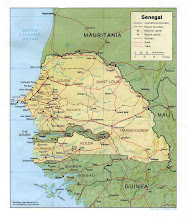In a swing through Dakar on his five-county friendship tour, Iran's President Ahmadinejad reiterated his country's support for Senegal's nascent auto industry in Thiès. The Iranians now promise to set up a tractor production factory in Senegal in the near future. Iran's automobile manufacturer, Iran Khodro Company, is partner in the SenIran factory, making the Samand sedan designed by Khodro. "With completion of the factory in Senegal, this country can export its cars to other regional countries," Ahmadinejad said.
I thought the Thiès plant was fully operational. Maybe not. The Wall Street Journal's recent article reported that the Iranian-Senegal joint venture was having trouble getting cars built. But maybe manufacturing still needs to be constructed.
According to Fars News Agency, Iran Khodro is the largest carmaker in the Middle East, Central Asia and North Africa regions with annual production of more than one million various vehicles including cars, trucks and buses.
Meanwhile... Apparently the Chinese will see if they can do better than the Indians when it comes to making Senbuses. Remember that Tata, the Indian manufacturing giant, also set up a factory in Thiès to build 500 "Senbuses," public conveyance intended to replace the colorful vehicles that served Dakar for so long, and are sure to be missed.
So now King Long, a Chinese outfit, subsidized with a $25 million loan from the Chinese government, has taken over the Tata operation, still in "partnership" with the Senegalese.
"I want to make Thiès the industrial capital of Senegal,” Senegal's President Wade decreed recently during a ceremony there for the new partnership.
Alas, an industrial infrastructure takes more than a government decree. And Senegal has not shown that it has whatever it takes yet. We'll see if the new Chinese-Senegal venture does better than the Iranian-Senegal venture or the Indian-Senegal venture... Maybe what it takes is the entrepreneurial, techno-savy capitalistic hussle that can only be found, where else: Detroit where are you? It's not like you have anything better going on back home.
Sunday, November 29, 2009
Wednesday, November 18, 2009
Big order for Senegal Airlines
Airbus said Wednesday that Senegal Airlines, the new national carrier of the Republic of Senegal, has signed a letter of intent for four A320 aircraft and two A330 aircraft.
Airbus, a wholly owned unit of European Aeronautic Defence & Space Co., didn't give a value for the deal, but it is worth approximately $700 million, according to list prices.
Senegal Airlines will start operating early next year from its hub in Dakar to destinations in Africa. It will replace Air Senegal International, according to a statement released at the Dubai Airshow.
Airbus, a wholly owned unit of European Aeronautic Defence & Space Co., didn't give a value for the deal, but it is worth approximately $700 million, according to list prices.
Senegal Airlines will start operating early next year from its hub in Dakar to destinations in Africa. It will replace Air Senegal International, according to a statement released at the Dubai Airshow.
IMF praises governance, bemoans economy
The International Monetary Fund just released its most recent (November 4-18) report on Senegal. Its assessment of the overall economy is gloomy, reflecting the world's economic doldrums. According to the IMF news release on the assessment:
“The global financial crisis and domestic shocks are affecting Senegal’s economy. Growth is expected to slow to 1¼ percent in 2009 from an already depressed 2½ percent in 2008. Business activity has been weak, remittances have been under pressure, and tax revenues are lower than expected. In the second half of this year the economy has also been undercut by electricity shortages and urban flooding."
The report has hopes for a turnaround in 2010, with growth of 3.5 percent. But its most positive comments were reserved for the Senegal government's fiscal discipline of late:
"All quantitative assessment criteria were met and key structural benchmarks have been completed. The stock of the government’s unpaid bills within the regular expenditure chain has been normalized. The mission welcomed progress with reforms to improve public financial management."
In other words, the public sector is continuing to pay its bills despite tough times. Real improvements will await economic recovery. Preparing fertile ground now would help.
"Measures to improve the business climate could include reducing delays in transferring property rights, better contract enforcement, and the simplification of customs procedures."
“The global financial crisis and domestic shocks are affecting Senegal’s economy. Growth is expected to slow to 1¼ percent in 2009 from an already depressed 2½ percent in 2008. Business activity has been weak, remittances have been under pressure, and tax revenues are lower than expected. In the second half of this year the economy has also been undercut by electricity shortages and urban flooding."
The report has hopes for a turnaround in 2010, with growth of 3.5 percent. But its most positive comments were reserved for the Senegal government's fiscal discipline of late:
"All quantitative assessment criteria were met and key structural benchmarks have been completed. The stock of the government’s unpaid bills within the regular expenditure chain has been normalized. The mission welcomed progress with reforms to improve public financial management."
In other words, the public sector is continuing to pay its bills despite tough times. Real improvements will await economic recovery. Preparing fertile ground now would help.
"Measures to improve the business climate could include reducing delays in transferring property rights, better contract enforcement, and the simplification of customs procedures."
Subscribe to:
Posts (Atom)


